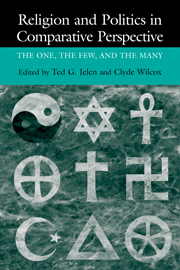Book contents
- Frontmatter
- Contents
- List of Contributors
- Preface
- 1 Religion: The One, the Few, and the Many
- 2 The Challenge of Pluralism
- 3 Catholicism, Politics, and Culture in the Republic of Ireland
- 4 Religion and Politics in Iberia
- 5 The Religious Dimension of Israeli Political Life
- 6 Between Heaven and Earth
- 7 Islamism in Contemporary Arab Politics
- 8 Religion and Politics in a Secular Europe
- 9 Religion and Democracy in South America
- 10 Looking for Hope in Central America
- 11 Religion and Politics in India
- 12 Religion and Politics in Japan
- 13 Religion and Politics in an Open Market
- 14 The Political Roles of Religion
- Index
2 - The Challenge of Pluralism
The Catholic Church in Democratic Poland
Published online by Cambridge University Press: 05 June 2012
- Frontmatter
- Contents
- List of Contributors
- Preface
- 1 Religion: The One, the Few, and the Many
- 2 The Challenge of Pluralism
- 3 Catholicism, Politics, and Culture in the Republic of Ireland
- 4 Religion and Politics in Iberia
- 5 The Religious Dimension of Israeli Political Life
- 6 Between Heaven and Earth
- 7 Islamism in Contemporary Arab Politics
- 8 Religion and Politics in a Secular Europe
- 9 Religion and Democracy in South America
- 10 Looking for Hope in Central America
- 11 Religion and Politics in India
- 12 Religion and Politics in Japan
- 13 Religion and Politics in an Open Market
- 14 The Political Roles of Religion
- Index
Summary
The political role of the Catholic Church in Poland has been fundamentally reshaped by the fall of communism and the rise of democracy in East Central Europe. Communist rule the Catholic Church to identify itself with the interests of the Polish nation and with opposition to a regime imposed from the outside. This political role has been questioned, critiqued, and even discarded after the transition to democracy. The Church suffered horribly under communism, but democracy and pluralism have posed challenges and raised obstacles that in the long run may be more threatening to the Church's role in society than anything offered by communism. This chapter is an examination of both this change in context, and of these challenges that have been the result.
TRADITION AND HISTORY
Patrick Michel wrote that “it was Soviet practice itself that assigned religion its potential role in Eastern Europe, and now that this practice no longer exists, the role allocated to religion can only undergo a total redefinition” (Michel 1992: 339–44). In the Polish case, the role of the Catholic Church was assigned in Poland not only by Soviet practice, but also by the invasions, partitions, and occupations that have dominated Polish history for the past two centuries. Poland was partitioned and wiped from the map from 1795 to 1918. It was invaded and brutally occupied by Nazi Germany in 1939. And it suffered under Soviet imposed communism until 1989 (Davies 1982).
- Type
- Chapter
- Information
- Religion and Politics in Comparative PerspectiveThe One, The Few, and The Many, pp. 25 - 44Publisher: Cambridge University PressPrint publication year: 2002
- 4
- Cited by



